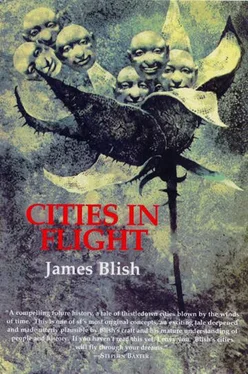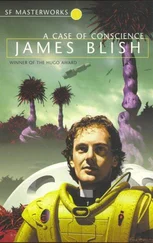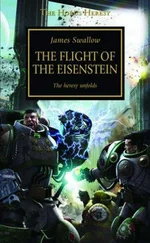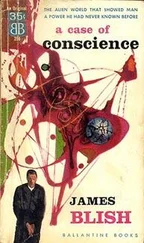James Blish - Cities in Flight
Здесь есть возможность читать онлайн «James Blish - Cities in Flight» весь текст электронной книги совершенно бесплатно (целиком полную версию без сокращений). В некоторых случаях можно слушать аудио, скачать через торрент в формате fb2 и присутствует краткое содержание. Жанр: Фантастика и фэнтези, на английском языке. Описание произведения, (предисловие) а так же отзывы посетителей доступны на портале библиотеки ЛибКат.
- Название:Cities in Flight
- Автор:
- Жанр:
- Год:неизвестен
- ISBN:нет данных
- Рейтинг книги:4 / 5. Голосов: 1
-
Избранное:Добавить в избранное
- Отзывы:
-
Ваша оценка:
- 80
- 1
- 2
- 3
- 4
- 5
Cities in Flight: краткое содержание, описание и аннотация
Предлагаем к чтению аннотацию, описание, краткое содержание или предисловие (зависит от того, что написал сам автор книги «Cities in Flight»). Если вы не нашли необходимую информацию о книге — напишите в комментариях, мы постараемся отыскать её.
Cities in Flight — читать онлайн бесплатно полную книгу (весь текст) целиком
Ниже представлен текст книги, разбитый по страницам. Система сохранения места последней прочитанной страницы, позволяет с удобством читать онлайн бесплатно книгу «Cities in Flight», без необходимости каждый раз заново искать на чём Вы остановились. Поставьте закладку, и сможете в любой момент перейти на страницу, на которой закончили чтение.
Интервал:
Закладка:
In the succeeding laboratory, antibiotics which had been found by the disc method were pitted against a whole spectrum of dangerous organisms. About 90 per cent of the discoveries were eliminated here, Gunn explained, either because they were insufficiently active or because they duplicated the antibiotic spectra of already known drugs. “What we call ‘insufficiently active’ varies with the circumstances, however,” he added. “An antibiotic which shows any activity against tuberculosis or against Hansen’s disease—leprosy—is always of interest to us, even if it attacks no other germ at all.”
A few antibiotics which passed their spectrum tests went on to a miniature pilot plant, where the organisms that produced them were set to work in a deep-aerated fermentation tank. From this bubbling liquor, comparatively large amounts of the crude drug were extracted, purified, and sent to the pharmacology lab for tests on animals.
“We lose a lot of otherwise promising antibiotics here, too,” Gunn said. “Most of them turn out to be too toxic to be used in—or even on —the human body. We’ve had Hansen’s bacillus knocked out a thousand times in the test-tube only to find here that the antibiotic is much more quickly fatal in vivo than is leprosy itself. But once we’re sure that the drug isn’t toxic, or that its toxicity is outweighed by its therapeutic efficacy, it goes out of our shop entirely, to hospitals and to individual doctors for clinical trial. We also have a virology lab in Vermont where we test our new drugs against virus diseases like the ’flu and the common cold—it isn’t safe to operate such a lab in a heavily populated area like the Bronx.”
“It’s much more elaborate than I would have imagined,” Paige said. “But I can see that it’s well worth the trouble. Did you work out this sample-screening technique here?”
“Oh, my, no,” Gunn said, smiling indulgently. “Waksman, the discoverer of streptomycin, laid down the essential procedure decades ago. We aren’t even the first firm to use it on a large scale; one of our competitors did that and found a broad-spectrum antibiotic called chloramphenicol with it, scarcely a year after they’d begun. That was what convinced the rest of us that we’d better adopt the technique before we got shut out of the market entirely. A good thing, too; otherwise none of us would have discovered tetracycline, which turned out to be the most versatile antibiotic ever tested.”
Farther down the corridor a door opened. The squall of a baby came out of it, much louder than before. It was not the sustained crying of a child who had had a year or so to practice, but the short-breathed “ah-la, ah-la, ah-la,” of a newborn infant.
Paige raised his eyebrows. “Is that one of your experimental animals?”
“Ha, ha,” Gunn said. “We’re enthusiasts in this business, Colonel, but we must draw the line somewhere. No, one of our technicians has a baby-sitting problem, and so we’ve given her permission to bring the child to work with her, until she’s worked out a better solution.”
Paige had to admit that Gunn thought fast on his feet. That story had come reeling out of him like so much ticker tape without the slightest sign of a preliminary double-take. It was not Gunn’s fault that Paige, who had been through a marriage which had lasted five years before he had taken to space, could distinguish the cry of a baby old enough to be out of a hospital nursery from that of one only days old.
“Isn’t this,” Paige said, “a rather dangerous place to park an infant —with so many disease germs, poisonous disinfectants, and such things all around?”
“Oh, we take all proper precautions. I daresay our staff has a lower yearly sickness rate than you’ll find in industrial plants of comparable size, simply because we’re more aware of the problem. Now if we go through this door, Colonel Russell, we’ll see the final step, the main plant where we turn out drugs in quantity after they’ve proved themselves.”
“Yes, I’d like that. Do you have ascomycin in production now?”
This time, Gunn looked at him sharply and without any attempt to disguise his interest. “No,” he said, “that’s still out on clinical trial. May I ask you, Colonel Russell, just how you happened to—”
The question, which Paige realized belatedly would have been rather sticky to answer, never did get all the way asked. Over Harold Gunn’s head, a squawk-box said, “Mr. Gunn, Dr. Abbott has just arrived.”
Gunn turned away from the door that, he had said, led out to the main plant, with just the proper modicum of polite regret. “There’s my man,” he said. “I’m afraid I’m going to have to cut this tour short, Colonel Russell. You may have seen what a collection of important people we have in the plant today; we’ve been waiting only for Dr. Abbott to begin a very important meeting. If you’ll oblige me—”
Paige could say nothing but “Certainly.” After what seemed only a few seconds, Gunn deposited him smoothly in the reception room from which he had started.
“Did you see what you wanted to see?” the receptionist said.
“I think so,” Paige said thoughtfully. “Except that what I wanted to see sort of changed in mid-flight. Miss Anne, I have a petition to put before you. Would you be kind enough to have dinner with me this evening?”
“No,” the girl said. “I’ve seen quite a few spacemen, Colonel Russell, and I’m no longer impressed. Furthermore, I shan’t tell you anything you haven’t heard from Mr. Gunn, so there’s no need for you to spend your money or your leave-time on me. Good-by.”
“Not so fast,” Paige said. “I mean business—or, if you like, I mean to make trouble. If you’ve met spacemen before, you know that they like to be independent—not much like the conformists who never leave the ground. I’m not after your maidenly laughter, either. I’m after information.”
“Not interested,” the girl said. “Save your breath.”
“MacHinery is here,” Paige said quietly. “So is Senator Wagoner, and some other people who have influence. Suppose I should collar any one of those people and accuse Pfitzner of conducting human vivisection?”
That told: Paige could see the girl’s knuckles whitening. “You don’t know what you’re talking about,” she said.
“That’s my complaint. And I take it seriously. There were some things Mr. Gunn wasn’t able to conceal from me, though he tried very hard. Now, I am going to put my suspicions through channels —and get Pfitzner investigated—or would you rather be sociable over a fine flounder broiled in paprika butter?”
The look she gave him back was one of almost pure hatred. She seemed able to muster no other answer. The expression did not at all suit her; as a matter of fact, she looked less like someone he would want to date than any other girl he could remember. Why should he spend his money or his leave-time on her? There were, after all, about five million surplus women in the United States by the Census of 2010, and at least 4,999,950 of them must be prettier and less recalcitrant than this one.
“All right,” she said abruptly. “Your natural charm has swept me off my feet, Colonel. For the record, there’s no other reason for my acceptance. It would be even funnier to call your bluff and see how far you’d get with that vivisection tale, but I don’t care to tie my company up in a personal joke.”
“Good enough,” Paige said, uncomfortably aware that his bluff in fact had been called. “Suppose I pick you up—”
He broke off, suddenly noticing that voices were rising behind the double doors. An instant later, General Horsefield bulled into the reception room, closely followed by Gunn.
Читать дальшеИнтервал:
Закладка:
Похожие книги на «Cities in Flight»
Представляем Вашему вниманию похожие книги на «Cities in Flight» списком для выбора. Мы отобрали схожую по названию и смыслу литературу в надежде предоставить читателям больше вариантов отыскать новые, интересные, ещё непрочитанные произведения.
Обсуждение, отзывы о книге «Cities in Flight» и просто собственные мнения читателей. Оставьте ваши комментарии, напишите, что Вы думаете о произведении, его смысле или главных героях. Укажите что конкретно понравилось, а что нет, и почему Вы так считаете.












